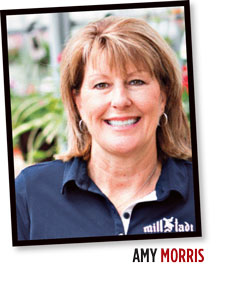2/1/2023
Growers Get Socked
Amy Morris

Some growers who use the H-2A guest worker program will pay wage rates as much as 15% higher than last year. The increase comes at a time when industry leaders have been seeking grower relief from high farm wage rates. Through December 20, the lame duck session of Congress failed to act on proposed legislation to reform aspects of the H-2A program.
“Congress missed a huge opportunity and did not do their part to improve production and increase the legal supply of labor,” Robert Guenther, chief public policy officer for the International Fresh Produce Association, said in a recent news release.
“Because of this inaction, consumers will continue to see record prices at the grocery store, producers will continue to face unaffordable, unpredictable input costs from out-of-control wage hikes and we will continue down the path to being a nation that is increasingly food insecure,” he added.
Now more than ever it’s so important to work with your legislators through advocacy, getting your House representatives or senators to your facilities. To explain how, as growers, we’re being pulled from every direction with no relief. Whether it’s the price of inputs going up, retailers not wanting to buy as much due to increased inflation or to the adverse wage of H-2A workers getting out of hand.
In mid-December, the Department of Labor (DOL) released the new adverse wage for each state. The simple average adverse effect wage rate for fiscal year 2023 is $16.13 per hour, according to the DOL notice. The Employment and Training Administration of the DOL is issuing this notice to announce the 2023 Adverse Effect Wage Rates (AEWR) for the employment of temporary or seasonal non-immigrant foreign workers (H-2A workers) to perform agricultural labor or services other than the herding or production of livestock on the range.
AEWR are the minimum wage rates the DOL has determined must be offered and paid by employers to H-2A workers and workers in corresponding employment to help ensure the department meets its statutory obligation to certify that the employment of H-2A foreign workers will not have an adverse effect on the wages of agricultural workers in the U.S. similarly employed. In this notice, DOL announced updates of the AEWRs and the average AEWR, which is used to calculate adjustments to required bond amounts for H-2A labor contractors.
I reached out to AmericanHort Advocacy team member Sara Neagu-Reed, who added, “I’d suggest adding a point on the missed opportunity to address the wage increases through legislative efforts this Congress. The AEWR freeze contained in Senator Michael Bennet’s [D-CO] Affordable & Secure Food Act would have frozen wages at the level in effect on the date of introduction of the bill. Additionally, guardrails would have been put in place to prevent the AEWR from increasing more than 3% in any given year. In recent years, the AEWR has been increasing 5% to 6% each year and, in most regions, is well over $15.00 an hour. The bill would have provided for granularity and more predictability in wages for employers. Sadly, it was not included in the spending package, which is a missed opportunity for growers who would have received immediate relief should this have made it past the finish line.”
The AmericanHort advocacy team is our best resource to get you as a grower in contact with your senators and representatives. They also provide a bi-annual trip to Washington, D.C., in September to put you face-to-face with your representatives called Impact Washington. I personally have gone several times with great results for my company. We’ve had Congressman Mike Bost [R-IL] at our place where he spent the day learning about our company and our needs from him. We get monthly updates from his press secretary on what he’s working on and what we can do to help our company. I suggest, if you could, make time this September to attend Impact Washington. You’ll see the benefit for your own company.
On a good note from Evan Lee in AmericanHort’s Capitol Wire newsletter, “H-2Bout Time! Finally, DOL and DHS authorized the release of 35,000 supplemental H-2B visas for the spring/summer season. The good news? This is by far the largest number of supplemental visas released under administration discretion. The not-so-good news? The rule includes some new conditions, like a rather bizarre requirement to notify AFL-CIO if you’re an industry that’s traditionally unionized. And DOL says that’s just about everyone, including landscaping.” GT
Amy Morris is Vice President of N.G. Heimos Greenhouses in Millstadt, Illinois. She can be reached at Amorris@ngheimos.com.